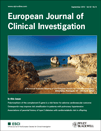Polymorphism of the complement 5 gene and cardiovascular outcome in patients with atherosclerosis
Abstract
Eur J Clin Invest 2012; 42 (9): 921–926
Background Humoral mediators of inflammation, in particular the complement system, have been described to play an important role in atherogenesis. Previously, we found a single-nucleotide polymorphism (SNP) in the complement 5 gene (C5 rs17611, A>G) independently associated with stroke. Up to now, the impact of C5 rs17611 on the progression of atherosclerosis and cardiovascular outcome in patients with asymptomatic atherosclerosis was unclear.
Materials and Methods We investigated C5 rs17611 in a cohort of 1065 consecutive patients with asymptomatic carotid atherosclerosis. All patients were prospectively followed for the progression of carotid atherosclerosis and the development of a first major cardiovascular event (MACE), respectively.
Results Three hundred and thirty-seven patients (31·6%) experienced a MACE during a median follow-up of 3·0 years. The homozygous GG genotype of the C5 rs17611 was significantly associated with adverse cardiovascular outcome (adjusted HR: 1·36 [95% CI, 1·07–1·73]; P = 0·01). After stratification for sex, C5 rs17611 CC was found to be an independent risk factor for MACE in men (HR 1·50 [95% CI, 1·12–1·83]). No association of C5 rs17611 with progression of carotid stenosis, observed in 93 (8·7%) patients, was detectable. Performance of ELISA indicated a significant association of the C5 rs17611 variant with C5a plasma levels.
Conclusion The C5 rs17611 GG genotype is associated with increased C5a plasma levels and represents a risk factor for adverse cardiovascular outcome in male patients with carotid atherosclerosis.




